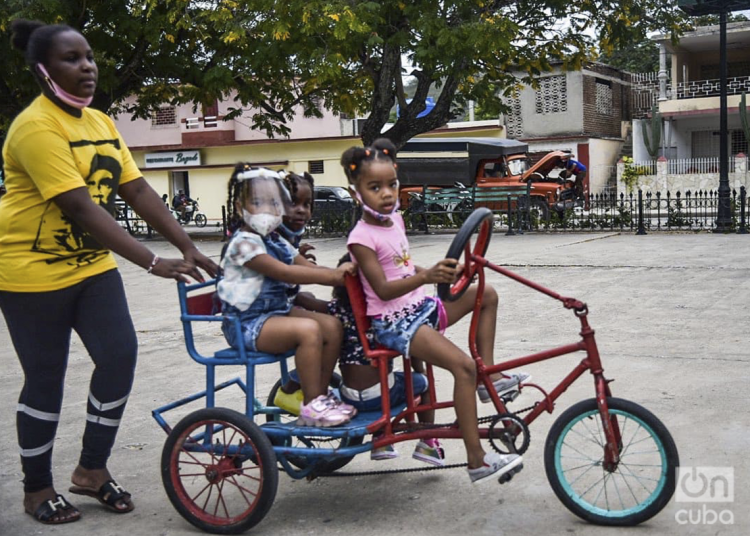The Family Code, which will be submitted to popular consultation next February, recognizes and protects diverse identities within Cuban families. Among the most prominent issues are those concerning children, adolescents and young people. In keeping with the Convention on the Rights of the Child (CRC), approved by the United Nations in November 1989, the bill assumes infants as subjects of law and not as the possession of adults.
The CRC recognizes that children (human beings under 18 years of age) are individuals with the right to full physical, mental and social development, and with the right to freely express their opinions. It also recognizes that, for the full and harmonious development of their personality, they must grow up within the family, in an environment of happiness, love and understanding.
UNICEF Cuba recently recognized the harmony that exists between the bill and the aforementioned Convention. It assures that the regulation assumes international standards and takes into account the recommendations made to Cuba by the Committee on the Rights of the Child, the United Nations body in charge of ensuring compliance with the CRC. The regulation also includes world commitment goals established in the Sustainable Development Goals, among which it highlights putting an end to all forms of violence against children and adolescents, as well as empowering and promoting the social inclusion of all people, regardless of age, gender, capabilities, or other conditions.
UNICEF Cuba recognizes the progress of the regulation put up for consultation, related to
- the inclusion of the best interests of the child;
- the recognition of relevant rights for children and adolescents;
- the requirement of specialization of the authorities and officials who intervene or resolve family matters;
- mainstreaming prevention and response to violence;
- the relevance of the right to participation of children and adolescents;
- the substitution of the institution of custody for the notion of parental responsibility;
- recognition of autonomy and progressive capacity;
- the modification of the regulations in relation to the legal representation of children and adolescents;
- the inclusion of shared custody and care;
- regulation of the right of children and adolescents not to be separated from their parents and the exceptional nature of such separation when it occurs;
- the regulation of foster care and foster families.
Among the contents of the Code that have aroused controversy, including conflicting positions, is that of the substitution of the institution of custody for that of parental responsibility, as well as the principle of progressive autonomy. Psychologist Roxanne Castellano, in a recently published analysis, made reference to the fact that custody is a legal term that originated in ancient Rome and that referred to the exclusive power of man (the father) over children. Within that design, childhood was worthless, to the point that children could be exchanged or sold. In addition, mistreatment was not frowned upon.
All that burden of negative meanings, says Roxanne, is still present when talking about custody, hence many countries in the world have been re-conceptualizing it, in correspondence with the development of humanity in terms of rights.
A factor that stresses the application of these new perspectives is the cultural aspect, the tradition, the sense of possession that is generated in the educational process of children and adolescents. The term parental responsibility, included in the new Family Code, reinforces the fact that being parents, more than possession implies responsibility for the lives and well-being of children. In that sense, parenting should be an act of respect and love for children.
This matter is one of the most significant changes proposed in the new Code. The regulation in force since 1975, in Title II, concerning parent-child relations, in the first section of Chapter II, refers to custody and its exercise. In its article 84 it affirms that children are obliged to respect, consider and help their parents and, while they are under their custody, to obey them.
This is a text based on the duties and rights of the parents, not of the children. In addition to legal, moral, and material responsibility, article 86 states that parents are empowered to reprimand and adequately and moderately correct their children under their custody, which, de facto, legitimizes and legalizes certain levels of violence.
In the current proposal, in Title I, the rights of children and adolescents are made explicit in Articles 5, 6 and 7, with terms such as full enjoyment and effective exercise of their rights to be heard in accordance with their capacity and progressive autonomy, and for their opinion to be taken into account. Rights that include participating in making family decisions related to their interests, receiving accompaniment and guidance for the exercise of their rights, living in an environment free of violence, having conditions for rest, play and recreation, the right to identity, to family communication, as well as to a digital environment free of discrimination and violence.
The new regulation has as its principle the best interests of children and adolescents, according to which any decision made by a competent authority in matters of childhood or adolescence must give primacy over any other concern. The determination of this interest must be made based on the assessment of the specific parental behaviors and their negative impact on the well-being and development of the child, as the case may be, and the real and proven damages or risks. Therefore, speculations, presumptions, stereotypes or generalized considerations about personal characteristics of the parents or cultural preferences regarding certain traditional concepts of family cannot be admissible.
The term of obedience, expressed in the current regulation, is replaced by that of responsibility in the new proposal. Title V, concerning parental relations, in Article 134, refers to the contents of the co-responsibility of mothers and fathers with respect to their children, to love them and provide them with emotional stability; contribute to the free development of their personality taking into account their capacities, aptitudes and vocation; educate them based on positive, non-violent and participatory forms of parenting; live together, whenever possible, and maintain permanent and meaningful family communication in their lives; promote an attitude of respect towards the equality of people, non-discrimination for any reason, and the rights of people with disabilities and those of the elderly; accompany them, in accordance with their progressive autonomy, in the construction of their own identity; provide them with education for a responsible sexuality; teach them to share housework and care.
The family is the first space for the socialization of human beings, and as more democratic and less authoritarian educational guidelines are established, more harmonious family environments and better conditions for social relations are created. The new Code is an invitation to educate for participation and to learn to exercise rights. It also suggests that adolescence should not be expected, but must be carried out according to the age and development of the child.
Naturalizing rights, learning by participating, relating based on affection and self-esteem, strengthening dignity, teaching a sense of care, as well as respecting and accepting differences, are invaluable contributions that families can make to other spaces of socialization such as school, community, the church, diverse social groups, so that children and adolescents learn, with quality, their condition as citizens.










